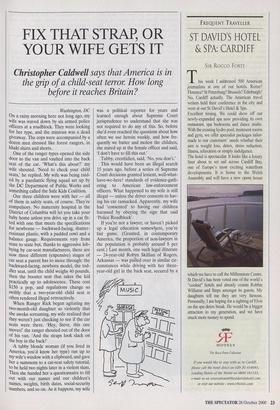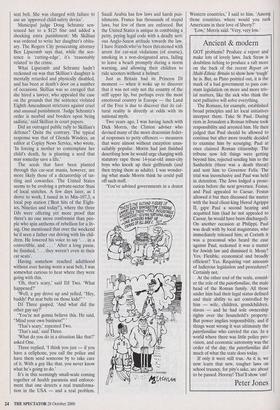FIX THAT STRAP, OR YOUR WIFE GETS IT
the grip of a child-seat terror. How long before it reaches Britain?
Washington, DC On a rainy morning here not long ago, my wife was waved down by six armed police officers at a roadblock. They were looking for her type, and the minivan was a dead giveaway. The cops were accompanied by a dozen men dressed like forest rangers, in khaki shirts and shorts.
One of the ranger types opened the side door to the van and vaulted into the back seat of the car. 'What's this about?' my wife shouted. 'Need to check your child seats,' he replied. My wife was being raid- ed by a paediatric flying squad set up by the DC Department of Public Works and something called the Safe Kids Coalition.
Our three children were with her — all of them in safety seats, of course. They're compulsory. No maternity hospital in the District of Columbia will let you take your baby home unless you drive up in a car fit- ted with one that meets the specifications for newborns — backward-facing, shatter- resistant plastic, with a padded cowl and a balance gauge. Requirements vary from state to state but, thanks to aggressive lob- bying by car-seat manufacturers, there are now three different (expensive) stages of car seat a parent has to move through: the backward-facing, newborn model, the tod- dler seat, until the child weighs 40 pounds, then the booster seat that takes the kid Practically up to adolescence. These cost $150 a pop, and regulations change so swiftly that a two-year-old child seat is often rendered illegal retroactively.
When Ranger Rick began agitating my two-month-old daughter so violently that she awoke screaming, my wife realised that they weren't just checking to see if the car seats were there. 'Hey, Steve, this one moves!' the ranger shouted out of the door of his van. 'And the straps look slack on the boy in the back!'
A tubby blonde woman (if you lived in America, you'd know her type) ran up to my wife's window with a clipboard, and gave her a summons to a car-seat safety tutorial, to be held two nights later in a violent slum. Then she handed her a questionnaire to fill out with our names and our children's names, weights, birth dates, social-security numbers, and so on. As it happens, my wife was a political reporter for years and learned enough about Supreme Court jurisprudence to understand that she was not required to do any of this. So, before she'd even reached the questions about how often we use heroin weekly, and how fre- quently we batter and molest the children, she stared up at the female officer and said, `I don't have to fill this out.'
Tubby, crestfallen, said, 'No, you don't.'
This would have been an illegal search 15 years ago, before a series of Supreme Court decisions granted lenient, well-what- have-we-here! standards of evidence-gath- ering to American law-enforcement officers. What happened to my wife is still illegal — unless the driver consents to hav- ing his car ransacked. Apparently, my wife had 'consented' to having our children harassed by obeying the sign that said `Police Roadblock'.
If you're not a lawyer, or haven't picked up a legal education somewhere, you're fair game. (Granted, in contemporary America, the proportion of non-lawyers in the population is probably around 8 per cent.) Last month, one such legal illiterate — 24-year-old Robyn Skillian of Rogers, Arkansas — was pulled over in similar cir- cumstances while driving with her three- year-old girl in the back seat, secured by a seat belt. She was charged with failure to use an 'approved child-safety device'.
Municipal judge Doug Schrantz sen- tenced her to a $125 fine and added a shocking extra punishment: Ms Skillian was ordered to write her daughter's obitu- ary. The Rogers City prosecuting attorney Ben Lipscomb says that, while the sen- tence is 'cutting-edge', it's 'reasonably related' to the crime.
What Lipscomb and Schrantz hadn't reckoned on was that Skillian's daughter is mentally retarded and physically disabled, and has been at death's door on a number of occasions. Skillian was so enraged that she hired a lawyer, who appealed the case on the grounds that the sentence violated Eighth Amendment strictures against cruel and unusual punishment. 'Judge Schrantz's order is morbid and borders upon being sadistic,' said Skillian in court papers.
Did an outraged public rally to Skillian's defence? Quite the contrary. The typical response was that of Glenda Winders, an editor at Copley News Service, who wrote, `In forcing a mother to contemplate her child's death, he is planting a seed that may someday save a life.'
The seeds that have been planted through this car-seat mania, however, are more likely those of a dictatorship of tat- tling and cowardice. The United States seems to be evolving a private-sector Stasi of local snitches. A few days later, as I drove to work, I tuned in to Mix-107.3, a local pop station (Test hits of the Eight- ies, Nineties and today!'), where the three DJs were offering yet more proof that there's no one more conformist than peo- ple who spin anthems of rebellion for a liv- ing. One mentioned that over the weekend he'd seen a father out driving with his chil- dren. He lowered his voice to say . in a convertible, and. . . . ' After a long pause, he finished, . . they weren't even in their car seats'.
Having somehow reached adulthood without ever having worn a seat belt, I was somewhat curious to hear where they were going with this.
`Oh, that's scary,' said DJ Two. 'What happened?'
`Well, a guy drove up and yelled, "Hey, buddy! Put seat belts on those kids!" ' DJ Three gasped, 'And what did the other guy say?'
`You're not gonna believe this. He said, "Mind your own business!" ' `That's scary,' repeated Two.
`That's sad,' said Three.
`What do you do in a situation like that?' asked One.
Three replied, 'I think you just — if you have a cellphone, you call the police and have them send someone by to take care of it. With a guy like that, you never know what he's going to do.'
It's in this seemingly small-scale coming together of health paranoia and enforce- ment that one detects a real transforma- tion in the USA — and a real problem. Saudi Arabia has few laws and harsh pun- ishments. France has thousands of stupid laws, but few of them are enforced. But the United States is unique in combining a petty, prying legal code with a deadly seri- ous Anglo-Saxon attitude towards the law. I have friends who've been threatened with arrest for car-seat violations (of course), smoking in a non-designated area, failing to leave a beach promptly during a storm warning, and allowing their children to ride scooters without a helmet.
Just as Britain had its Princess Di moment — when it woke up to discover that it was not only not the country of the stiff upper lip, but perhaps even the most emotional country in Europe — the Land of the Free is due to discover that its cul- tural reality is directly at odds with its national myth.
Two years ago, I was having lunch with Dick Morris, the Clinton adviser who devised many of the more draconian feder- al responses to petty offences — measures that were almost without exception unas- sailably popular. Morris had just finished describing how he would urge charging with statutory rape those 14-year-old inner-city boys who knock up their girlfriends (and then trying them as adults). I was wonder- ing what made Morris think he could pull off such stuff.
`You've advised governments in a dozen Western countries,' I said to him. 'Among those countries, where would you rank Americans in their love of liberty?'
`Low,' Morris said. 'Very, very low.'



























































































 Previous page
Previous page